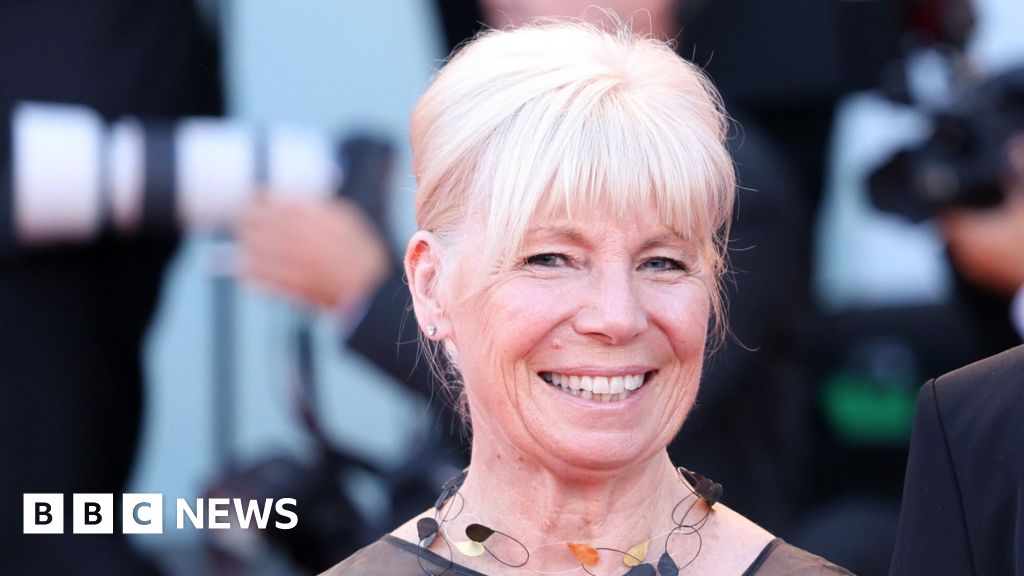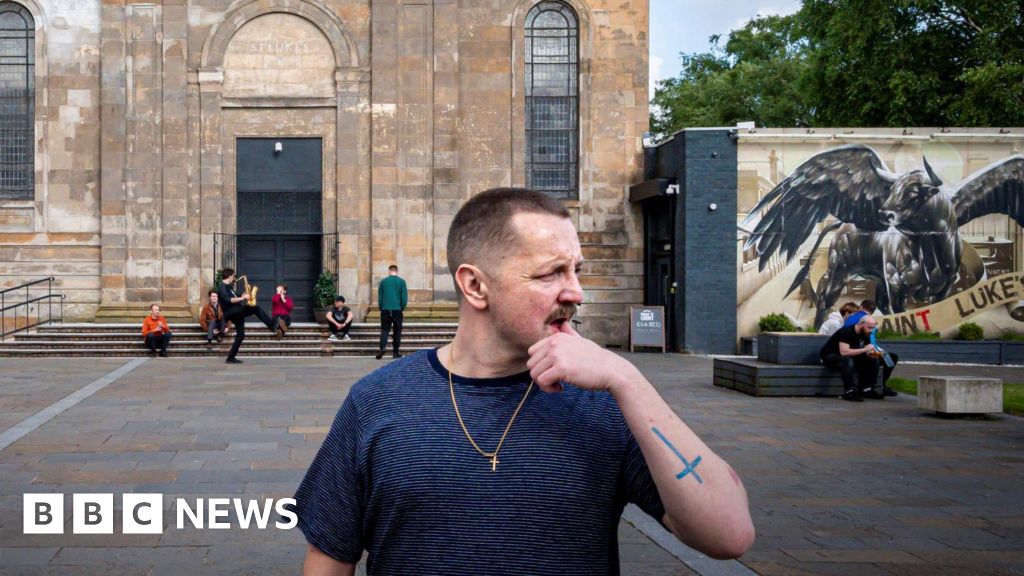ARTICLE AD BOX
 Image source, ITV
Image source, ITV
By Emma Saunders
Entertainment reporter
Warning: This article contains spoilers.
"Ever had a night where it felt like your whole life led up to it? The night that got you in a headlock, stuck its tongue in your mouth, knocked you down and then puked you back up again?"
Welcome to the world of Jonny, the seemingly hedonistic teenager who lives life to the full in Mark O'Sullivan's new ITVX drama Tell Me Everything. But there's more to Jonny than meets the eye. Beneath the banter with his best mates, he is seriously struggling.
Played by newcomer Eden H Davies, Jonny is a 16-year-old growing up in Hertfordshire's Welwyn Garden City but none of his friends have seen him over the summer. The truth is, he's been ill with undiagnosed anxiety and depression and has kept it hidden. Then his dad dies suddenly and his world falls apart.
"Jonny is very loosely based on me, a much, cooler version of teenage me," O'Sullivan, who grew up in Welwyn Garden City himself, tells me.
"I'm so pleased we decided to set it there because I think we all have slightly tricky kind of relationships with the places we grew up, especially if they're the smaller places because they can feel suffocating.
"My story, which is some of the stuff that Jonny goes through, was the starting point. Some of it is very autobiographical. And some of it isn't. My teenage years were often pretty horrible, for lots of reasons, not least of which was my dad's sudden death."
Image source, ITV
Image caption,Have teenagers got it tougher than ever in 2022?
While Jonny tries to keep a lid on his feelings, it's not always possible and he lashes out at his best mates Neve (Lauryn Ajufo) and Louis (Spike Fearn) who have no idea why he is behaving that way.
Davies says: "I think Johnny is quite typical of a lot of young men. He struggles with his mental health hugely. And I think it's the bottling up and the anger that he feels and it's not really anger, it's just emotion. He doesn't know where to place it. Hopefully people will relate."
Refreshingly, the drama refuses to gloss over the tedium of depression and anxiety, zoning in on the panic attacks, insomnia and self-doubt that are often part of these conditions.
"Sometimes, when we talk about mental health as a theme, it's in danger of being glamorised... in a way that's appeasing to people," Davies says.
"What we did was create something that's ugly and jagged. And that's how it is. Jonny is not always the nicest person and if audiences can see that, maybe it can help them see it in other people and their friends."
Mental health stories
Alex Bushill, head of Media at Mind tells the BBC: "It has never been more important for broadcasters to create accurate, authentic, and sensitive storylines about mental health.
"Our research shows that the influence of mental health stories is even stronger among young people, with two in five people aged 18-24 realising they had experience of mental health problems after seeing a soap or drama.
"We have seen a fundamental shift in the way we think about mental health. This is reflected so much more in how we depict mental health on screen. But despite an improving picture with more and more powerful and authentic depictions there is still a way to go."
ITV's chief executive, Dame Carolyn McCall, said in September that ITVX would aim to upgrade the "very clunky user experience" of the ITV Hub. She added it would offer many more programmes, with more than 9,000 hours available for free in an attempt to appeal to younger audiences.
Ajufo, who starred in acclaimed short film Boiling Point with Stephen Graham ("He literally is my TV dad and really helped me pave the way in my career"), says she learned a lot about mental health herself while filming Tell Me Everything.
Image source, Getty Images
Image caption,O'Sullivan says that while social media has changed things for teenagers, some issues around growing up haven't changed.
"There's this general consensus of what depression is but this shows you how someone just isolating themselves... is a sign of depression. Some people might just see it as them having some me time when it's actually a cry for help. So when Jonny eventually does lash out, this is what can happen with a build-up of depression."
Davies adds that "it was hard at times to film stuff of that nature because you have to access a place that's difficult" but they were supported by therapists on set at all times.
By now, you might be wondering if the series is a bit heavy and unrelenting but don't be fooled by the premise.
O'Sullivan was also behind Channel 4 comedy Lee and Dean, and Tell Me Everything has plenty of lighter moments, too, including a crazy late night car drive, parties and plenty of hilarious and cutting one-liners.
Ajufo, whose character is both an A-grade pupil and a party animal, says: "You have your highs and lows. Naturally around the age of 16, you're going through things with exams and university and pressures. And it's nice this shows that's not our only mindset.
'Light moments'
"We do know how to have a laugh and we still know how to be kids. The car scene, for instance, all of that was fun because it's like: 'This is what we do on the weekends!'"
O'Sullivan adds that including humour was essential: "I've always needed to search out the shards of light among the darkness, for my own sanity as much as anything else. My humour always tends towards the darker, edgier places."
And it's Jonny who is often the star performer, the class clown.
Davies says: "It was great to have those light moments… and have Johnny forget himself for a minute, or just use it as a tool to cover up because that's one of the most common ways that people deal with mental health problems."
Some of the dark humour is showcased via Jonny's use of social media, as he inappropriately posts selfies from his dad's funeral, for example.
Social media is a constant presence in the series as it is in all our lives, particularly for teenagers.
'So addictive'
"I'm of the opinion that it's harder growing up now than it's ever been outside of wartime," O'Sullivan says.
"I think social media and technology, as much as a cliche as it sounds, is to blame for that. It also does an awful lot of good but I do think these teenagers have got it tougher than ever.
"What we're trying to do is show some of those struggles and also show that some of it is really universal as well, no different than what I was going through 30 years ago."
Davies and Ajufo both say they have had to shut off some apps on their phones for their wellbeing.
"It's so addictive. I had to delete TikTok which I'm getting withdrawals from," Davies laughs, while Ajufo says she "likes to do a social detox, I will disappear. I won't tell anyone. All my notifications are off. I've gone back to reading, I listen to music, I go for walks, I started cycling".
O'Sullivan, whose own teenagers have given the first two episodes their seal of approval, says: "I hope they (the audience) see themselves and their lives reflected in an honest, real, raw way. And see that they're not alone in the struggles they're going through. Everyone is fighting an often invisible battle. And everything passes - the good and bad."
Tell Me Everything is available on ITV's new streaming service ITVX from 8 December.

 2 years ago
23
2 years ago
23








 English (US) ·
English (US) ·